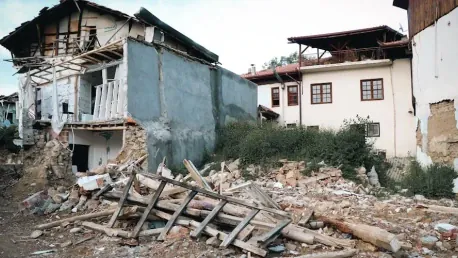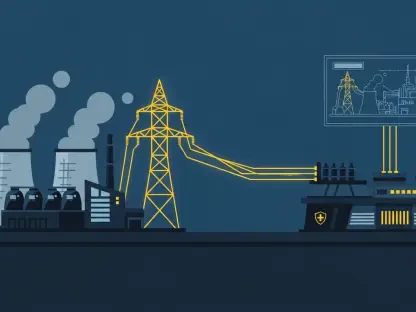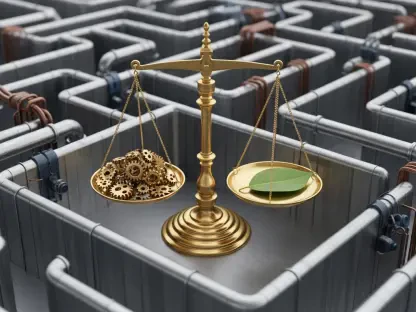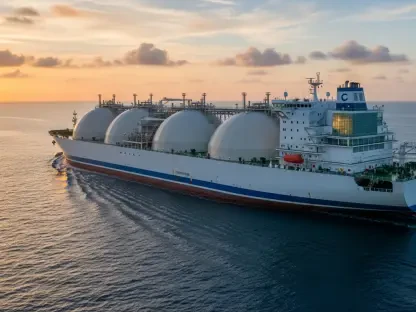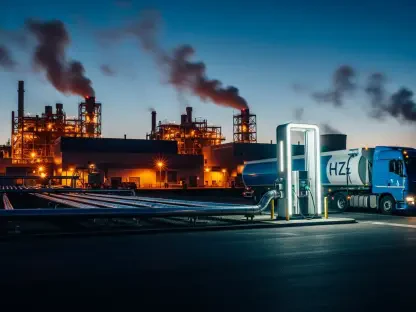Two years after a devastating earthquake in Türkiye affected 11 cities, leaving many without homes, formidable reconstruction efforts have been made. Minister Murat Kurum, in an interview with Nebi Miş, General Director of the Foundation for Political, Economic, and Social Research (SETA), provided a comprehensive update on these efforts and other crucial urban and environmental projects. The discussion highlighted the significant progress in restoring homes, revitalizing city centers, and prioritizing environmental sustainability to ensure resilience for future generations.
Extensive Reconstruction Efforts
Rebuilding Homes and Infrastructure
Since February 2023, Türkiye has embarked on an extensive reconstruction journey that aims to rebuild areas severely damaged by the earthquake. Minister Kurum described the concerted efforts involving 182,000 architects, engineers, and workers tasked with rebuilding 201,431 homes. As of January 2025, 46,307 homes had been completed in Malatya, achieving 45% of the planned rebuild targeted for completion by the end of 2025. This massive endeavor is supported by a reconstruction budget exceeding TL 2 trillion ($55.37 billion), with TL 584 billion specifically allocated for 2025, underscoring the country’s commitment to restoring normalcy for affected communities.
The reconstruction effort not only focuses on the sheer number of homes but also emphasizes resilient and sustainable infrastructure. The collaborative approach ensures that modern building standards are adhered to, enhancing the safety and quality of life for residents. Additionally, strategic planning and advanced technologies facilitate the efficient management of resources. This comprehensive rebuilding initiative demonstrates Türkiye’s dedication to creating secure and sustainable living environments, exemplifying the nation’s resolve to turn the devastating impact into an opportunity for progressive urban development.
On-Site Transformation Program
The ‘On-site Transformation’ program is another key initiative aimed at revitalizing the hardest-hit city centers through a holistic approach to redevelopment. With TL 23 billion dedicated to this effort, both the regional infrastructure and economy are being rebuilt in parallel to create a sustainable future for affected communities. This program not only focuses on physical reconstruction but also on economic revitalization, ensuring that the communities can thrive once again. It incorporates sustainable practices and green technologies, promoting environmentally friendly growth.
Implementation of the ‘On-site Transformation’ program involves close collaboration with local authorities and stakeholders. By investing in critical infrastructure such as schools, healthcare facilities, and public amenities, the program ensures comprehensive redevelopment that addresses all aspects of community life. Businesses affected by the earthquake are receiving support to rebuild, fostering economic resilience and encouraging the reopening of local enterprises. The holistic nature of this initiative demonstrates a well-rounded recovery strategy that goes beyond mere physical reconstruction to foster economic resilience and social cohesion.
Addressing Earthquake Risks in Istanbul
Urban Transformation Projects
The Ministry is also dealing with earthquake risks in Istanbul, where 1.5 million homes are considered at high risk. Kurum reported that 907,000 homes have already been transformed, but he expressed concerns about the lack of proactive measures from the Istanbul Metropolitan Municipality. He mentioned that new regulations will be introduced to ensure the city’s preparedness with the aim to complete Istanbul’s transformation by 2025. This initiative is essential for safeguarding the city’s population and ensuring that the infrastructure can withstand future seismic activity.
In addition to structural upgrades, ongoing monitoring and assessment of vulnerable areas are integral to the urban transformation projects in Istanbul. Advanced seismic resilience techniques and the latest engineering solutions are being employed to fortify the city’s infrastructure. A comprehensive risk management approach includes public awareness campaigns to educate citizens on earthquake preparedness and safety measures. These initiatives are crucial for fostering a culture of resilience and readiness among Istanbul’s residents, ensuring a proactive stance in mitigating risks associated with seismic events.
Social Housing and Support Initiatives
These measures include various urban transformation projects such as the Social Housing campaign, the “Half Is Ours” project, and grants and loans. The government has provided over 1.4 million homes and 47,905 social facilities, benefiting 5 million low-income citizens. Of particular note is the construction of 312,000 social homes, with the 50,000 and 100,000 housing projects nearing completion and 88,000 homes under construction as part of the ongoing 250,000 social housing campaign. This effort underscores the government’s commitment to providing secure and affordable housing for all citizens, particularly the economically disadvantaged.
In addition to building new homes, the social housing initiatives include comprehensive support systems to ensure sustainable living conditions for beneficiaries. Community facilities such as schools, healthcare centers, and recreational areas are integrated into these housing projects. Furthermore, residents receive access to vocational training programs and employment opportunities to enhance their socioeconomic well-being. This multifaceted approach not only addresses the immediate need for housing but also contributes to long-term community development and economic stability.
Environmental Sustainability Initiatives
Tackling Pollution in Izmir Bay
Environmental concerns are also a top priority for the Ministry. In dealing with the environmental crisis in Izmir Bay, where fish deaths have been linked to oxygen depletion and high ammonia levels, Kurum explained that the Ministry had responded quickly by sending expert teams to the area. Following the Izmir Bay Coordination Council meeting on September 5, 2024, an Urgent and Short-Term Action Plan was developed and implemented, aiming to protect the Bay’s ecosystem and reduce pollution sources, termed the “Breathe for Izmir” project. This initiative underscores the commitment to ensure future generations can enjoy a clean and safe Izmir Bay.
The action plan includes measures such as enhanced monitoring of water quality, stricter regulations on industrial discharges, and the implementation of advanced wastewater treatment technologies. Collaboration with local stakeholders and environmental organizations is also a critical component of the plan. Educational outreach programs are being conducted to raise awareness among local communities about the importance of preserving the bay’s ecosystem. Through these collective efforts, the “Breathe for Izmir” project aims to restore the ecological balance of Izmir Bay and prevent future pollution.
Addressing Mucilage in the Marmara Sea
Similarly, the ongoing environmental issues in the Marmara Sea, particularly mucilage, were addressed with the creation of the “Marmara Sea Action Plan” in 2021. Kurum stated that 19 actions from the plan have been completed while three remain in progress. He emphasized that reducing land-based pollution is crucial to combatting mucilage and called on municipalities to renew wastewater treatment plants in line with the Marmara Sea Protection and Action Plan. This concerted effort highlights the importance of maintaining healthy marine ecosystems and the commitment to sustainable environmental practices.
The Marmara Sea Action Plan employs a multi-faceted approach to address the complex issue of mucilage. This includes reducing agricultural runoff, improving waste management practices, and restoring natural habitats that help absorb excess nutrients. Regional cooperation is essential, involving multiple municipalities and international partners working together to implement best practices. Ongoing research and innovation in environmental science are also pivotal, providing data-driven solutions to protect the Marmara Sea from further degradation. This comprehensive approach aims to ensure the long-term health and sustainability of the marine environment.
Advancing Waste Management and Green Initiatives
Zero Waste Initiative
The “Zero Waste” initiative has had a significant impact as well, evolving into a global model for environmental consciousness. Kurum detailed the establishment of the system in nearly 200,000 buildings and campuses, raising awareness among 23 million citizens and increasing recycling rates from 13% in 2017 to 34.92% in 2023. The next phase involves the introduction of the Deposit Return System, predicted to reduce carbon emissions, save energy, and decrease landfill use. This initiative is expected to save 37,000 tons of greenhouse gas emissions and 1.3 billion kWh of energy annually, with an economic benefit valued at 500 million euros ($519 million).
The Zero Waste initiative encompasses comprehensive recycling programs, waste reduction measures, and public education campaigns. New infrastructure for waste separation and collection has been established across cities and rural areas to facilitate efficient recycling. Innovations such as smart waste management systems and waste-to-energy technologies are being integrated into the broader strategy. Through partnerships with businesses and civic organizations, the initiative fosters an environment where sustainability is woven into everyday practices, significantly reducing the environmental footprint.
Green Transformation Project
Two years after a devastating earthquake in Türkiye impacted 11 cities, leaving countless individuals homeless, substantial reconstruction efforts have been underway. In a recent interview with Nebi Miş, General Director of the Foundation for Political, Economic, and Social Research (SETA), Minister Murat Kurum offered a detailed update on the progress and future plans. The dialogue underscored significant advancements in rebuilding homes, rejuvenating city centers, and prioritizing environmental sustainability. Minister Kurum emphasized the importance of these initiatives in fostering resilience for future generations. Efforts are not just focused on physical reconstruction, but also on creating smarter, more sustainable urban environments. This approach seeks to mitigate the impact of future natural disasters. The government’s commitment extends to addressing environmental concerns, ensuring the new infrastructures are not only robust but also eco-friendly. The momentum of these efforts promises a brighter, more resilient future for the affected communities.
